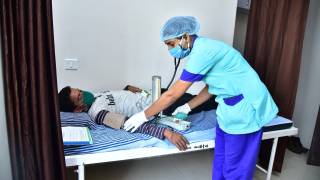Low Testosterone Indicates Higher COVID-19 Risk for Men

A single-center cohort study of patients with COVID-19 led by researchers from the Washington University School of Medicine found lower testosterone concentrations during hospitalization were associated with increased disease severity and inflammation in men.
Published in the JAMA Network Open on May 25, 2021, this study could not prove that low testosterone is a cause of severe COVID-19. But low levels could simply serve as a marker of some other causal factors.
These researchers urge caution with ongoing clinical trials investigating hormonal therapies that block or lower testosterone or increase estrogen treatment for men with COVID-19.
"During the pandemic, there has been a prevailing notion that testosterone is bad," said senior author Abhinav Diwan, M.D., a professor of medicine.
The researchers noted that other factors that increase the risk of severe COVID-19, including advanced age, obesity, and diabetes, are also associated with lower testosterone.
"The groups of men who were getting sicker were known to have lower testosterone across the board," commented first author Sandeep Dhindsa, M.D., an endocrinologist at Saint Louis University, in a related press statement.
"We also found that those men with COVID-19 who were not severely ill initially, but had low testosterone levels, were likely to need intensive care or intubation over the next two or three days. Lower testosterone levels seemed to predict which patients were likely to become very ill over the next few days."
Among 152 patients (90 [59.2%] men with mean age, 63 years, 143 patients (94.1%) were hospitalized. Among 66 men with severe COVID-19, median testosterone concentrations were lower at day 0 (53 [18 to 114] ng/dL vs 151 [95 to 217] ng/dL; P = .01) and day 3 (19 [6 to 68] ng/dL vs 111 [49 to 274] ng/dL; P = .006) compared with 24 men with milder disease.
Testosterone concentrations were inversely associated with concentrations of interleukin 6, C-reactive protein, interleukin 1 receptor antagonist, hepatocyte growth factor, and interferon γ–inducible protein 10.
In addition, the researchers found that lower testosterone levels in men also correlated with higher levels of inflammation and an increase in the activation of genes that allow the body to carry out the functions of circulating sex hormones inside the cells.
Estradiol and IGF-1 concentrations were not associated with COVID-19 severity in men. And testosterone, estradiol, and IGF-1 concentrations were similar in women with and without severe COVID-19.
In other words, the body may be adapting to less testosterone circulating in the bloodstream by dialing up its ability to detect and use the hormone. The researchers don't yet know the implications of this adaptation and are calling for more research.
"We are now investigating whether there is an association between sex hormones and cardiovascular outcomes in long COVID-19 when the symptoms linger over many months," said Diwan, who is a cardiologist.
"We also are interested in whether men recovering from COVID-19, including those with long COVID-19, may benefit from testosterone therapy. This therapy has been used in men with low levels of sex hormones, so it may be worth investigating whether a similar approach can help male COVID-19 survivors with their rehabilitation."
This study used Washington University's COVID-19 biorepository and was conducted to collaborate with the university's Institute of Clinical and Translational Sciences, which includes Saint Louis University School of Medicine.
This work was supported by the National Institutes of Health (NIH), grant numbers R37 AI049653, P30 DK020579, HL107594, and HL143431; and a grant from The Foundation for Barnes-Jewish Hospital to facilitate data collection from the WU350 cohort, which supported these studies. These studies also were supported by the Washington University Institute of Clinical and Translational Sciences, grant number UL1TR002345, from the National Center for Advancing Translational Sciences of the NIH.
The researchers disclosed no industry conflicts of interest.
Based in St. Louis, Missouri, Washington University School of Medicine's 1,500 faculty physicians also are the medical staff of Barnes-Jewish and St. Louis Children's hospitals.
PrecisionVaccinations publishes research-based news.
Our Trust Standards: Medical Advisory Committee
























